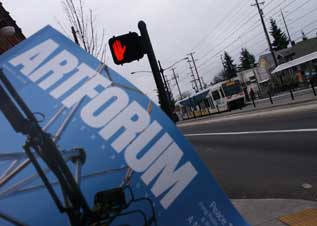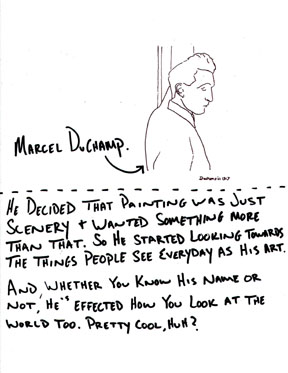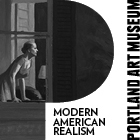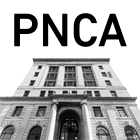
|
||
|
Portland art blog + news + exhibition reviews + galleries + contemporary northwest art
|
||
ArtForum's Slant on Red 76's Ghosttown 
It is swell that the March 2006 issue of ArtForum has a 2 page article on Red 76's Ghosttown project in Portland but it excludes some important facts, while projecting a pretty distorted picture of the arts group and the city's art scene (10,000+ artists) in order to conform to the personal tastes of the writer, Matthew Stadler. The article is essentially Stadler's version of utopia and although it strings together some interesting wordsmithing, many ArtForum readers won't know they are reading through a rather sanitizing filter that removes most traces of political engagement, art world success and sophistication. Ghosttown itself was a low key, monthlong series of happenings in January from a stay at home film festival to a clothing exchange, all of which circumvented the exchange of money and promoted social interaction. It's all pretty typical collective stuff weve seen in droves since before the 2002 Whitney Biennial and featured again in the 2006 version (this time completely accepted by the powers that be). Thus, I find it strange that Stadler treats the group as apolitical, accidental and somehow operating outside of the sophisticated sanctions of art world and art history (as if to say Portland artists aren't aware of such stuff). This is demonstrably wrong.  Red 76's Poster from Free Art History (2004) The first sentence is a red herring when it states Sam Gould and Khris Soden, "have scant interest in art history." This distinction falls apart instantly when looking at projects chronicled on Red 76's own website such as Free Art History (2004). They seem pretty interested to me considering they tacked illustrated posters to telephone poles which stated, "Marcel Duchamp... He Thought Paintings Were Just Scenery + Wanted Something More Than That. So He Started Looking At Things People See Everyday As His Art."[sic] Mr. Stadler might not want to acknowledge Marcel Duchamp (while namedropping everyone else from Charles Ludlum to ArtForum contributor Claire Bishop) but he is clearly the prototype for Red 76's activities. In fact, the group displays the same kind of subversive, yet strategically shallow nihilistic evangelism that early Dada was noted for, despite Stadler questioning whether "this marks an important shift in art history." Yes this was an important shift ... back in 1916 or so, anyone heard of Tristan Tzara? Maybe Stadler is the one with a "scant interest in art history." Instead, Gould and Soden practice a studied (and popular) form of art historical indifference which is completely different from the picture painted in ArtForum of hapless naives inventing Dada on their own. Another important omission is that the "loading dock" for the Open Kitchen was in fact the loading dock of a respected gallery. Far from disinterest in the art world and its machinations Soden and Gould were reconnoitering the privileged and loaded... loading dock of an art gallery. This was a form of art historically sanctioned piracy and it is all the more interesting for its connection to other similar non commercial interventions or meeting places such as Gordon Matta Clark's Food. As for a lack of political content, Stadler sacrifices facts for his romantic notions. One of my favorite Red 76 projects was called called How To... Protest Song Karaoke from 2005. This is especially convenient memory loss for Stadler because he was a coconspirator for the Taking Place series of lectures and events that the Protest Song Karaoke was part of. To be sure Ghosttown traffics in the shadowpolitics of circumventing capitalist transactions with projects like its Clothing Exchange and this anticorporate attitude is a common trait in the art scene here. Still, by being involved in Bard College's Center for Curatorial Studies as they were a few weeks ago in New York and their upcoming stint at Yerba Beuna they are working within the system in a sanctioned way. I suspect mentioning Bard and Yerba Buena might have been inconvenient to the Artforum piece's thesis too. Stadler might consider half-assed "trenchant" and that's a fine and valid Duchampian attitude but in returning to a the subject of a panel that he and several PORT staffers (myself included) took part in, articles are documentation of ephemeral events and the details matter. Portland is chock full of artists (10000+) and many of the more sophisticated ones, like Red 76, are trying to reshuffle the deck the 20th century dealt us. Out of respect one should note the huge variety of art practices going on in Portland from Chandra Bocci's decidedly not half-assed 70ft long Otterpop rainbows and a yellow brick road made of thousands of mustard packets to Storm Tharp's equally virtuosic drawings etc. In their own way Red 76 with their Duchampian sampling of the everyday have been very sophisticated about what they negate for several years now and deserve a similar level of documentation. Posted by Jeff Jahn on March 17, 2006 at 22:32 | Comments (10) Comments I've witnessed some of these projects and I don't remember thinking too much about how the "everyday" had been reconsidered or that I was witnessing a challenge to the established art world or commerce for that matter. I'm still wondering if the guy who painted the kid with the mouthful of cigarettes has any prints for sale. Anyone? Posted by: jerseyjoe BTW, thanks for the nice email comments. Also, I should point out that Dada was initially a reaction to the bourgeois agendas that many artists/writers at the time felt started WWI. Dada, although a negation was bourne of political tension. Posted by: Double J [Comment Removed by Moderator (Jennifer Armbrust) 3.17.06 12:42pm] Posted by: portlandart Reply from Matthew Stadler: Hey Jeff, thanks for caring. I get the feeling you and I have very different hopes for writing about art. So, well, right on. Your reply beats complacency or doctrine. I don't care that there are 10,000+ artists in Portland. I cared about Ghosttown, so I wrote about it. I did not document the project or explain Portland or articulate Red76's notion of what they thought they were doing. I don't ask artists to tell me what their art means. They do their work — they make the art — and I do mine, which is writing. To write I pay close attention and I engage my mind — the one that has thoughts and desires and imagination, and, in this case, I used Ghosttown as a medium for thinking. That's what I do when I write. I think by writing through the artwork. Writing refracts the artwork. It does not reflect or replicate it. So does that constitute, as you put it, "distortion?" I don't read the Duchamp flyer the same way you do. It's actually one of the pieces I was thinking of when I characterized Red76's scant interest in art history. Their assessment of Duchamp ("pretty cool, huh?") is so pitch perfect, so exactly ahistorical. Here's their full description of Free Art History (a bunch of Xeroxed flyers on bulletin boards): "Instead of announcing a '88 Honda Civic for sale, or a lost cat, though, the Free Art History flier series gives a brief description of modern and contemporary artists in only a few short sentences. The name, Free Art History, implies two ideas — Most obviously it is free of charge. Nothing to buy. Secondly, and just as obviously, due to issues of class and race, many people are blocked from gaining access to intellectual issues such as contemporary art. In this manner we hope to provide free art history to the general public." So, I don't know, how would you characterize this kind of interest in art history? I call it scant. You complain that my piece "removes most traces of political engagement, art world success and sophistication." How did "sophistication" (a word I never use) become an issue? For sure, I like casting Sam and Khris as self-taught outsiders, which in Khris's case is pretty valid. In Sam's case, his lack of a degree is the part of his chameleon performance that I find most interesting. The insider-ness of Red76's use of arts institutions is common and unremarkable stuff. It neither defines their work, nor does it offer any interesting futures. I don't characterize Red76 as "accidental and somehow operating outside of the sophisticated sanctions of art world and art history." Again "sophisticated." What's with that word? I think you fear that I'm attacking people (you say "as if Portland artists aren't aware of such stuff"). I'm sure all 10,000+ artists are totally "aware of such stuff," which doesn't interest me at all. Red76's spasms of concern for the sanctions of the art world etc. are also dull and common but I am deeply moved when they forget these sanctions and respond to what's in front of their faces. The Red76 that's indifferent to art history and depth is hugely interesting, and not because they are somehow unsophisticated or ignorant. No. Exactly the opposite — in those moments of Ghosttown when such concerns faded away, they were brilliant. Whole new worlds opened up, as happens often for me with work that does not horde meanings in notions of depth. This isn't a shift that happened in 1916. Depth and layers and the whole architecture of concealment and revelation thrived in dada and were codified in surrealism. I'm interested in a different set of relations — entirely, expansively horizontal — which does not have a robust history within western art. It certainly has a lot of writers and curators flummoxed now. I'm not sure why you overlooked it, but I also characterize this shift as creating a whole new politics. I point out that the work is profoundly political—but because I am unmoved by protest song karaoke and focus on this more radical transformation you say I dismissed Red76 as "hapless naives" who are "apolitical" (your words; never mine). Maybe this is indefensible, but by writing I hope to enact ways of thinking that might take the artist's work and carry it further, like in a relay race, then hand the baton back to the artist. So, in writing about Red76 I tried to tell them things that might be news to them. I refracted them. Is this useful? I don't know. I hope so. It is not a document of the work. The work provides its own documentation. Not all writing is documentation, thank god. I did not write my "version of utopia." I am deeply ambivalent about the qualities I perceive in this work. I'm moved by what it triggered in me, but I have no idea what that portends. My hope is that the issues I raised are interesting enough to artists that I soon learn more by paying attention to what they bring back to the discussion and then responding, again, in kind, by writing. [ed. note: sent via email by Matthew Stadler 03.20.06] Posted by: keuro Thanks Matthew, It's true we see things very differently and my goals in general are not to refract, reflect, redirect or act as an educational resource for artists. Mine is simply to present pertinent facts and my own subjective opinions with some inspired context. As inconvenient as it may seem, all non fiction is a form of documentation and since your essay makes claims to "take art criticism at all seriously," I'm afraid I must be a pain in the ass about this Duchamp omission. It's true I care and I'm glad you made it clear in this exchange that you, "used Ghosttown as a medium for thinking." To contrast us for the sake of taking a constructive position, Ghosttown isn't so much something I can use, it was part of the ecology I inhabit and I hope my actions beat complacency and resist turning artists into a kind of ventriloquist act. Think of this exchange as a birdcall which the artsts involved may or may not hear. It matters not if my words effect Red76, but it will likely reach other ears and that is important. Since we are both being transparent here, my primary condition of worth is one of respect for the creative activities of artists, yours included, and it is my goal to bring a little bit more to the appreciation of your take through questioning it, while broadening the discussion by reintroducing some rather important omissions. Of course your style isn't at question, its completeness is. As you mention some of this "is indefensible," especially the Marcel Duchamp issue. Look, if an arts group puts posters of Marcel Duchamp up on bulletin boards that say, "And Whether You Know His Name Or Not He's Effected The Way You Look At The World," that public declaration is a clear statement of intent and follow through and whether someone admits it or not, Duchamp really matters here. I believe you mistake Red76's calculated and easy air for scantiness. Sure, you can define it as such but "scant interest" does not bring anyone to make a project of such public proclamations. Actions speak louder than words. Sure, Red 76 is trying to demystify and make Duchamp accessible. This is not "scant," it's nonchalant, pleasant evangelism and Red 76 has always seemingly delighted in such art interventions, from creating very indie looking cardboard street signs, to the DJ parasite takeovers of juke boxes in Ghosttown. Like all of the most salient art, the experience will overcome its history when confronted with the art, but it also gains richness when placed within the vast context of related endeavors after the fact. Your list of Ludlum, Cobain and Pessoa is perceptive of course but it only makes the Duchamp oversight more prominent. By foregrounding the topic of authorship, (R. Mutt anyone?) drag acts, (Rrose Selavy someone?) and the related pseudonym/heteronym discussion it just doesn't make sense to leave out the figure on whose shoulders Red 76 in part stands. This just isn't a completely different set of relations no matter how "entirely, expansively horizontal," it might seem because Duchamp and Dada did go here in different ways before, (Kurt Schwitters' "Merz", Gordon Matta Clark's "Food" and Franz West's "Passtuck" etc. all have some parallel's as well). As for why I ignored what you have characterized as "creating a whole new politics" it is because your piece seems takes great pains to bury that subtext. Take for example, "....a take-it-for-granted sense of optimism that disabled any programmatic reading readings of the work as a site of struggle, whether social, political or artistic." This also sounds vaguely utopian and that is why I attribute it. I'm just reading between the lines am I wrong? True, my use of "apolitical" might not be your word but it is understandable how one might make the connection. Other quotes like, "....such a redemptive gaze is much more than a politics; it is a metaphysics...." make it a reasonable assumption. Lastly, the concluding sentence nullifies the weight of that argument for a "whole new politics" when it characterizes, "Ghosttown's indifference to struggle, or the enactment of political and aesthetic depth suggests that this is in fact, the new territory we are faced with." My point is they are not indifferent; they are trying to go underground and recapture some of the community and human interaction without the capitalism seizing control of the modes of distribution. The Dadaists had communism as a viable alternative to capitalism, the difference now is that option doesn't appear available. As far as the 10,000+ artists in Portland, that is somewhat off the subject. It's a figure I included for context because nearly every trace of the art world context, including the art gallery loading dock were left out. Also, although it's a boring fact for us in Portland it might help others less familiar understand why so much hullabaloo has been raised. As far as "sophistication," it seems like a much more loaded term for you than it does me, I dont fear it's use or lack of inclusion, I simply find it pertinant. What is the big deal?... will the word "sophistication" somehow kill Red 76 much like sunlight effects fictitious vampires? I can say Sam has a sophisticated mind and Khris has his own shtick, a kind of Martin and Lewis act. Sophistication can be very nonchalant and accessible (see Duchamp). Also, my aim isn't to beat a dead horse so let's just open up this discussion to take it beyond how many rhetorical moves two writers can make and invite additional responses. First, I'm curious why this importance of horizontality? It's a simple enough concept but I think positing a claim for a new territory begs for details as Wal-Mart, Starbucks and other corporations have focused on horizontal integration for many years. Are artists simply adopting these strategies? WTO in Seattle doesn't get discussed enough either. In addition, instead of the term "horizontal" Red 76's activities could just as easily read as resolutely indie as they continually go underground for their aesthetics? Going underground implies a kind of depth and it is a big part of Portland and Seattle's history as well (Ghosttown can be any town USA but paradoxically it can be seen as very Portlandly too). Arguably this indie nature does relate to Dada's anti bourgeois aspect. I think part of the reason some writers and curators seem as you say "flummoxed now" is that the artists are pointing out the problem may be those very writers and curators (along with the market). Along, those terms has the latest Whitney Biennial has hit that iceberg by trying to restate some of the now accepted 2002 biennial's focus on the indie? Also, Red 76's engagement with art institutions is very interesting because it is a test of two seemingly incompatible but pragmatic dancing partners (Forcefield didnt seem to survive it from the 2002 Whitney Biennial, maybe that was inevitable with a collective). Still, institutions rely on artists for legitimacy and vice versa. The feedback loops between artists and institutions say a lot about the times. In the case of Red 76, it might be the institutional yearning to engage the community or any large museum?s inability to go underground. It's a yearning that doesn't always translate too well yet both sides still seem game. It's not a dead end; it's an asymptote that hasn't found a truly satisfactory expression yet. Artists always find a way. I was particularly glad to see the mention of the M.O.S.T. group, their mostlandian embassy rife with benign bureaucracy at TBA may be a solution. To ask some other questions without proper answers, does Open Kitchen relate to Open Source Movement? Portland, with the presence of Linus Torvalds here has some claims to being ground zero for the open source movement. Is Red 76 riffing on the ubiquity of the "open" term these days? possibly? Also, if one buys into the "unintelligibility of depth" issue in your article it certainly brings up Murakami's idea Superflat as well. This shift towards surface and lack of high/low distinctions happened many years ago and Dave Hickey got there on the material side via Murakami. Purely for conjecture's sake one could ask, is there a grand unifying theory of everything reconciling object oriented and non object oriented art? That probably isn't productive but I believe this rigorous, seeming superficiality is just another form of Aristotelian ambivalence but I believe the democratic aspects both of Red 76 and very visual art actually counter that ambivalence and heighten personal interaction, whether between people or art objects. Is the answer simply entertainment that isn't crassly marketed? Taking this back to the subject of the bruhaha, my favorite Project from Ghosttown was the Stay At Home Film Festival, even though sadly I couldn't make it to one. I heard of some that just weren?t properly organized but still, conceptually it seemed perfect. I like how it inverts the whole home theater trend as an isolating and privatization of theaters and opens these environs as public space. It also smacks of that great old Greek tradition of xenia, where travelers could expect hospitality from strangers and if possible some entertainment might ensue? Ahhh there is that pesky history again. Posted by: Double J Doesn’t it interest you to engage the possibility of art without recourse to hierarchy or depth? It’s so thrilling, so unlike what Hickey did with his masterful writing about surface, his cultivation of heroic narratives of the artist’s ascendancy. I’m moved by the failure of Red76 to support that kind of meaning. Look at them! What a fine regard they offer, restlessly moving among us, across a vast array of places at great distance, over an expanse that is never up nor down. What a relief to no longer waste our time constructing hierarchies of meaning, plumbing depths, or carrying out games of reference and revelation. I wouldn’t call this utopian. It might be a kind of death. Who knows? I don’t agree that talking about Duchamp adds much to Red76. Their relation to his work is not much more thoughtful than yours or mine. Anyone working with everyday things has a relation, but theirs doesn’t go very far. Really, despite your enthusiasm, I can’t imagine looking to Red76 for insights into any aspect of art history. That’s just not their strength at all. R. Mutt and Rrose Selavy are good examples of the divergence between Duchamp and what I found interesting in Ghosttown. Both Mutt and Selavy were pseudonyms, which is to say stops along the way to our usual final destination — the artist whose primacy is again confirmed by the facts of the masquerade. They were jokes, puns that dealt heavily in irony. The punch line was the fact that Duchamp made them. Heteronyms are different. In Pessoa’s case, there were four writers with their own independent histories and work. Fernando Pessoa was one author among these four, and notably he was an acolyte, not the leader; the primary figure was Alberto Caeiro. Heteronyms are not ironic. They do not resolve themselves in the revelation of “true” authorship. They simply exist side by side, and in that way they seem more like the work that interests me now, all these names that are neither true nor false. I loved WTO. I spent the whole time bicycling aimlessly through the smoke and destruction. Talk about horizontal! I suppose it belonged in the Artforum piece, but you can see what I had to say at http://www.thestranger.com/seattle/Content?oid=2733 I didn’t talk about “subcultures” or “the underground” because those are both hierarchical notions, notably based on height and depth, to which this work seemed indifferent. For sure, Ghosttown used means that are called those things, but they also (as you point out) used very “mainstream” “high culture” means (small A loading dock, Disjecta support, now Yerba Buena) and didn’t push a distinction between the two. Neither high nor low was cultivated or repudiated, suggesting to me that Red76 was indifferent to the “high” and the “low.” Who needs the idea of “the underground?” My experience is that “the underground” is a marginalizing term that secures the predominance of one part of the culture over another. Posted by: Matthew Stadler To be picky, Rrose Selavy was a heteronym by one definition and Duchamp didn't always make them, Man Ray was involved too. It's very characteristic for Duchamp/Selavy to complicate the understanding of his/her ideas, motives and authorship. Duchamp was very clear about creating the character so that Rrose could do her thing and certainly qualifies as a heteronym defined by wikipedia as "one or more imaginary character(s) created by a poet, to write in different styles." We could get into the definition of "True Heteronyms" which would rule out both of our uses since the spelling must be the same and mean completely different things. Let's avoid that Council of Trent moment! A little closer to Red 76's practices, I think the political nature of WTO was very related to their activities and it's why I don't buy the idea of them as tuned out hippies. Knowing them only makes that interpretation more difficult, Sam Gould in particular is way more punk rock than that. As for "underground", plenty would consider the Underground Railroad a mark of distinction, but that is a subjective thing for each of us to work out. I do think "indie" is just as fine, which implies there is a another less independent heirachy at work whch they are an "alternative" too. Similarly Red 76 does use the term "black market" in some of their projects. The important idea is they are subverting the mainstream modes of distribution. Subversion implies some acknowledgement of heirarchical depth in my mind and it's true I see things differently than you... a lack of any heirarchy doesnt seem to be possible as long as any system is alive and kicking. Red 76 seems to be a pragmatic response to the status quo of capitalism, whatever that might be... so for my understanding it matters not if they are some new art historical shift, which they just aren't. They are a response to their times, standing on the shoulders of others. I enjoy the effects and options they present and I think there is some common ground between our interpretations in those regards.
Posted by: Double J I'm sort of late to the party, but my comment can be found here. Posted by: LeisureArts Thanks L.A. All arts discourse from Duchamp's own statements to people smoking and chatting on the corner contains a series of winks and nods. The point is, it all matters to varying degrees. Yet, one can always use the letter of the law to defeat the spirit of it. Matt's points speak to his interests and the same goes for myself. One of my interests is that artist's actions and words be taken into account in their asessment, although I dont always buy their intent it should be addressed. Of course the unintentional is just as important but I prefer to look at both to suss what game is afoot. The ambiguity is part of the fun. It should be noted that both Matt and I know Sam and Khris, plus we live in the same city and there some are obscure, good natured politics at work here. Thus, some of the winks and nods here might not have the same context elsewhere. Suffice it to say this has all been done to flesh out the discussion on Red 76, rather than trying to shift the debate into some kind exstensive audit of the parrallels and paradoxes between Duchamp and those who cite his influence. But if this has inspired you to do so, more power to you! Posted by: Double J I am happy to see the discussion get fleshed out and already noted your familiarity with all of the players in the conversation. I won't bother to get trapped in a Princess Bride type infinite recursion of intent/counter-intent by saying that I did not "intend" to "shift the debate." I'll let my comments stand, but add that Matthew was right and you were wrong (wink wink). Posted by: LeisureArts Post a comment Thanks for signing in, . Now you can comment. (sign out)
(If you haven't left a comment here before, you may need to be approved by
the site owner before your comment will appear. Until then, it won't appear
on the entry. Thanks for waiting.)
|
| s p o n s o r s |
 |
 |
 |
 |
 |
 |
 |
 |
 |
 |
 |
 |
 |
 |
 |
 |

|
Site Design: Jennifer Armbrust | • | Site Development: Philippe Blanc & Katherine Bovee | |


![[TypeKey Profile Page]](http://www.portlandart.net/nav-commenters.gif)